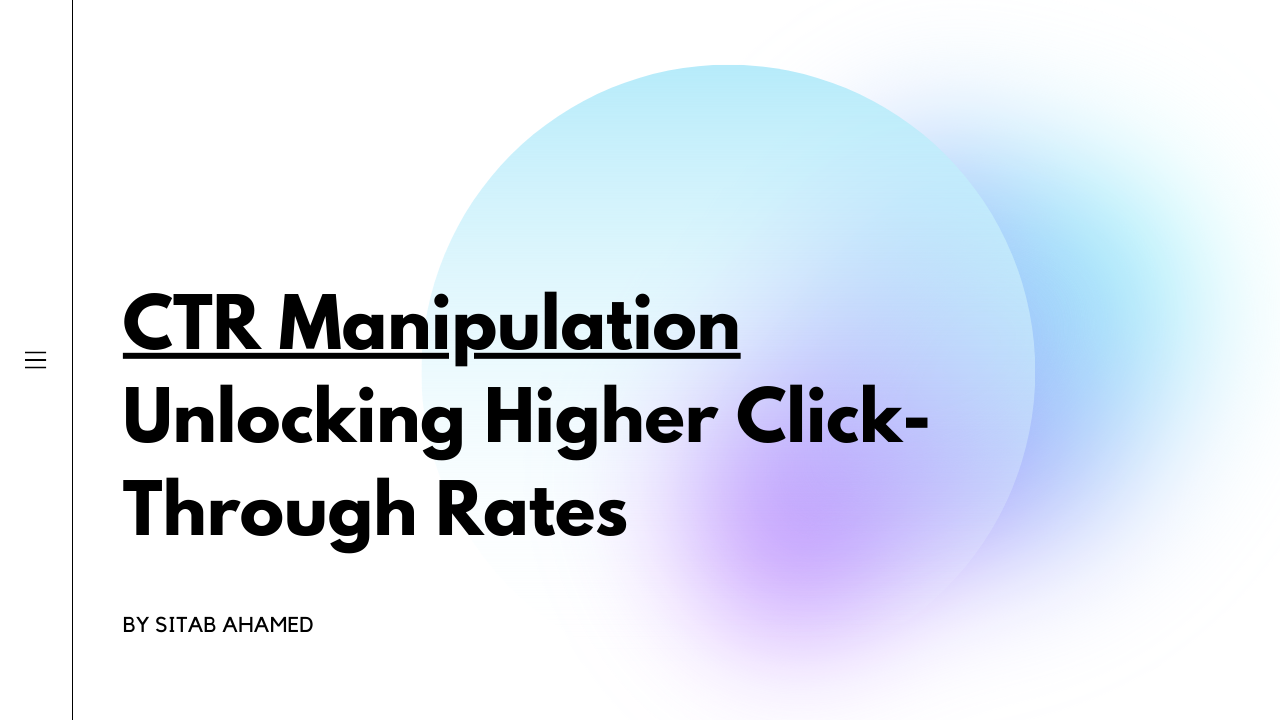CTR Manipulation-- Effective Techniques for Improving Click-Through Fees
Wiki Article
CTR Adjustment: A Video Game Changer for Digital Campaigns
The increase of CTR control has actually unquestionably transformed electronic advertising approaches, supplying marketing professionals with devices to enhance interaction and drive traffic effectively. What effects might this stabilizing act hold for the future of digital projects?Comprehending CTR Manipulation
Although click-through price (CTR) manipulation might appear like a simple strategy in digital marketing, it encompasses a range of strategies focused on artificially pumping up interaction metrics. This control can take various types, consisting of making use of click farms, robots, or deceptive ad positionings that misinform customers right into clicking. These strategies can endanger the honesty of efficiency information, making it challenging for marketers to determine the real efficiency of their projects.Furthermore, CTR manipulation raises honest issues, as it threatens the transparency of digital advertising. The dependence on inflated metrics can result in misdirected advertising choices, skewing resource allotment and campaign approaches. As a result, businesses may invest greatly in channels and techniques that show up successful yet do not generate actual involvement or conversions.

Advantages of Click-Through Rate Optimization
Optimizing click-through price (CTR) is essential for boosting the efficiency of electronic advertising and marketing projects. A greater CTR shows that a larger percentage of individuals are involving with the material, which can lead to boosted site traffic and better conversion rates. By improving CTR, brands can successfully allot their marketing sources to campaigns that produce the highest returns.Among the primary benefits of CTR optimization is the capacity for boosted advertisement placement and lower prices - CTR Manipulation. Systems like Google Ads compensate greater CTRs with much better advertisement positioning and minimized cost-per-click (CPC), enabling online marketers to stretch their budgets even more. Furthermore, a well-optimized CTR can enhance brand exposure, as greater interaction rates often associate with increased organic reach

Strategies for Effective CTR Adjustment
To effectively adjust click-through rates (CTR), marketing professionals can utilize a variety of calculated strategies that improve customer engagement and drive traffic. One essential approach is enhancing ad duplicate to produce compelling and action-oriented language. CTR Manipulation. Making use of strong call-to-action (CTA) expressions urges individuals to take instant action, raising the likelihood of clicksAn additional effective method is A/B testing, which allows marketing professionals to contrast different advertisement variants. By methodically examining performance metrics, they can recognize which components reverberate finest with the target market, consequently improving their strategies for optimal impact. Furthermore, leveraging aesthetically attractive graphics and succinct messaging can record interest quickly, making it a lot more likely that individuals will certainly involve.

Finally, enhancing landing pages to guarantee a seamless user experience can decrease bounce rates and motivate further interaction, eventually fostering greater CTR. By incorporating these methods, marketers can efficiently manipulate CTR to attain their project objectives.
Gauging Success in Digital Projects
Determining success in CTR Manipulation Service digital projects needs a clear understanding of essential performance indications (KPIs) that line up with project goals. KPIs serve as quantifiable metrics that assist evaluate the effectiveness of numerous methods employed throughout the project. Usual KPIs consist of click-through rates (CTR), conversion prices, expense per procurement (CERTIFIED PUBLIC ACCOUNTANT), and return on investment (ROI)To effectively gauge success, it is vital to establish specific, quantifiable goals at the outset of the campaign. If the key goal is to increase brand recognition, metrics such as impressions and involvement rates might be prioritized. On the other hand, campaigns concentrated on direct sales would certainly gain from an extra comprehensive evaluation of conversion rates and profits generated.
Routine evaluation of these KPIs allows marketing professionals to make data-driven choices, maximizing their strategies in real-time. Utilizing logical devices can aid in monitoring performance and recognizing trends, permitting speedy modifications to boost project results. Ultimately, a thorough strategy to gauging success not only highlights locations for improvement but also enhances the overall effectiveness of digital advertising and marketing initiatives, driving continual development and engagement in the long-term.
Future Fads in Digital Advertising
Preparing for the future of digital advertising discloses a landscape formed by quick technical developments and altering customer habits. As synthetic intelligence and device discovering proceed to progress, marketers will increasingly take advantage of these innovations to customize campaigns at an unprecedented scale. Anticipating analytics will certainly make it possible for brand names to expect consumer demands, optimizing ad placements and content delivery in real time.Moreover, the surge of voice search and wise gadgets is changing exactly how customers connect with electronic content. Marketing experts will certainly require to adjust their approaches to make sure exposure across numerous platforms, including voice-activated aides. This change requires a concentrate on conversational advertising, emphasizing engagement via dialogue as opposed to standard marketing tactics.
In addition, personal privacy concerns are prompting changes in data collection methods. Openness and moral data use will end up being paramount, driving brand names to foster trust fund and loyalty amongst consumers. The recurring evolution of social media platforms will certainly likewise affect advertising strategies, with an increased focus on authenticity and user-generated web content.
Conclusion
In recap, CTR control represents a substantial innovation in electronic marketing strategies, using instant advantages with enhanced involvement metrics. The continuous evolution of electronic advertising will certainly depend on this delicate interaction, shaping the future landscape of brand-consumer communications.Report this wiki page